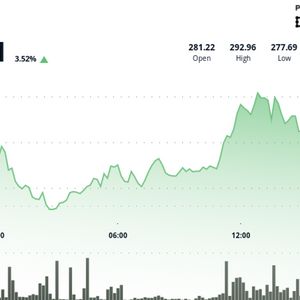Japanese Yen: Urgent Warning on Yen Assets Amid Escalating Election and Tariff Risks
6 min read
BitcoinWorld Japanese Yen: Urgent Warning on Yen Assets Amid Escalating Election and Tariff Risks In the dynamic world of finance, where every ripple can become a wave, even seemingly distant macroeconomic shifts can send tremors through various asset classes, including cryptocurrencies. Recently, financial giant Bank of America (BofA) has sounded a cautionary note regarding Japanese Yen assets, highlighting potential vulnerabilities that could have far-reaching implications. For those tracking global markets, understanding these concerns is crucial, as they hint at broader economic uncertainties that often influence investor sentiment across the board. Why Are Japanese Yen Assets Facing Scrutiny? Bank of America’s recent assessment points to a confluence of factors creating headwinds for Japanese Yen assets. Japan, a major global economy and a significant player in international trade, sees its currency and financial instruments closely watched. BofA’s primary apprehension stems from two significant external pressures: the upcoming political landscape and the ever-present threat of global trade disputes. These aren’t isolated issues; they intertwine to create a complex risk profile for one of the world’s most traded currencies. Understanding the Looming Election Risks Political stability is a cornerstone of economic confidence. BofA’s analysis underscores how upcoming election risks , both within Japan and in major trading partners like the United States, could introduce significant volatility for the Japanese Yen. What exactly are these risks? Policy Uncertainty: A change in government or a shift in political priorities can lead to new economic policies, fiscal spending plans, or monetary stances. Such shifts can directly influence investor confidence, bond yields, and the yen’s exchange rate. Geopolitical Shifts: Elections can alter a nation’s foreign policy stance, potentially impacting trade relations, alliances, and regional stability. For Japan, a nation heavily reliant on exports, shifts in global trade dynamics due to external elections are particularly pertinent. Market Reaction: Markets dislike uncertainty. As election cycles heat up, investors may adopt a wait-and-see approach, leading to capital outflows or increased hedging, both of which can pressure the yen. These political uncertainties create a fog for investors trying to predict future economic trajectories, making Japanese Yen assets a more speculative holding. The Shadow of Tariff Concerns on Global Trade Beyond political shifts, the specter of escalating tariff concerns casts a long shadow over the global trade landscape, directly impacting export-oriented economies like Japan. Tariffs, essentially taxes on imported goods, are often deployed as a protectionist measure, but their ripple effects are far-reaching. Consider these key impacts: Disrupted Supply Chains: Imposing tariffs can force companies to re-evaluate their global supply chains, leading to higher production costs and reduced efficiency. For Japanese manufacturers deeply embedded in global networks, this can be a significant challenge. Reduced Export Demand: If tariffs are imposed on Japanese goods by major trading partners, or if global trade slows due to widespread tariffs, demand for Japanese exports will likely decline. This directly impacts corporate profits and, by extension, the national economy. Currency Volatility: Trade imbalances exacerbated by tariffs can put pressure on currencies. A nation facing reduced exports might see its currency weaken as foreign demand for its goods (and thus its currency) diminishes. BofA’s warning suggests that renewed trade tensions could specifically dampen the outlook for Yen assets , as Japan’s economic health is intrinsically linked to its export performance. How Do These Factors Impact Yen Assets ? So, how do these overarching risks translate into tangible effects on Yen assets ? BofA’s concerns are not abstract; they point to concrete financial vulnerabilities. The primary channels of impact include: Currency Depreciation: Increased uncertainty from elections or a slowdown in global trade due to tariffs can lead investors to move capital out of Japan, weakening the Japanese Yen. A weaker yen makes imports more expensive and could fuel inflation, impacting the purchasing power of Japanese citizens and the profitability of some businesses. Bond Market Volatility: Japan’s government bond market is one of the largest in the world. Political instability or economic downturns could lead to higher bond yields as investors demand greater compensation for perceived risk, potentially increasing government borrowing costs. Stock Market Performance: Japanese equities, particularly those of export-heavy companies, are highly sensitive to global trade conditions and currency fluctuations. A stronger yen can hurt exporters, while economic uncertainty can dampen overall investor sentiment, leading to stock market declines. These interconnected effects underscore the fragility that BofA perceives in the current environment for Japanese Yen holdings. Broader Implications for the Global Economic Impact While the immediate focus is on Japanese Yen assets, the concerns raised by BofA have significant broader implications for the global economic impact . Japan is the world’s third-largest economy, and any significant instability there can create ripple effects worldwide. Key considerations for the global economy include: Investor Confidence: A downturn in a major economy like Japan can dampen overall global investor confidence, leading to risk aversion and a flight to perceived safer assets. This can impact capital flows across all markets. Trade Flows: As discussed, Japan is a crucial link in many global supply chains. Disruptions there, whether due to tariffs or internal economic woes, can affect manufacturing and trade worldwide. Monetary Policy: The Bank of Japan’s (BOJ) monetary policy decisions are closely watched globally. If the yen weakens significantly or the economy faces severe headwinds, the BOJ might be compelled to adjust its ultra-loose monetary policy, which could have knock-on effects for global interest rates and liquidity. Cryptocurrency Market Sensitivity: While not directly linked, the cryptocurrency market is increasingly sensitive to global macroeconomic shifts. Periods of heightened risk aversion or significant economic uncertainty often lead to either a flight to ‘safe haven’ digital assets (if perceived as such) or a broader sell-off as investors de-risk across all asset classes. Understanding these traditional market pressures provides valuable context for predicting crypto market movements. Therefore, the stability of Yen assets is not just a regional concern but a barometer for broader global financial health. Navigating Uncertainty: Actionable Insights In an environment marked by such elevated election risks and tariff concerns , what can investors do to navigate the potential volatility? Diversification: Spreading investments across different asset classes, geographies, and currencies can help mitigate risk. Relying too heavily on any single market, especially one facing specific headwinds, can be precarious. Stay Informed: Keep a close watch on political developments in key economies and trade policy announcements. Understanding the underlying drivers of market movements is paramount. Risk Management: For those with exposure to Japanese assets or the yen, consider hedging strategies to protect against adverse currency movements or market downturns. Long-Term Perspective: While short-term volatility can be unsettling, maintaining a long-term investment horizon often helps weather temporary storms. Evaluate your risk tolerance and investment goals. These insights are vital for any investor looking to safeguard their portfolio amidst the current macroeconomic landscape impacting Yen assets . Bank of America’s cautionary stance on Japanese Yen assets serves as a timely reminder of the interconnectedness of global financial markets. The interplay of looming election risks and persistent tariff concerns creates a challenging outlook for Japan’s currency and financial instruments. These factors not only pose a direct threat to the stability of Yen assets but also signal potential broader turbulence for the global economic impact . As investors, staying vigilant and adopting a proactive approach to risk management will be crucial in navigating these complex macroeconomic currents. To learn more about the latest Forex market trends, explore our article on key developments shaping the Japanese Yen liquidity and institutional adoption. This post Japanese Yen: Urgent Warning on Yen Assets Amid Escalating Election and Tariff Risks first appeared on BitcoinWorld and is written by Editorial Team

Source: Bitcoin World



